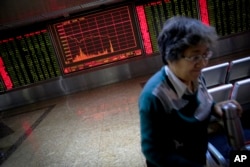Stock prices in China and other Asia markets plunged on the first trading day of the year, triggering significant falls in prices on European bourses.
After a key index of 300 Chinese stocks dropped five percent in the early afternoon, trading was automatically halted for 15 minutes – utilizing a recently introduced “circuit breaker” mechanism.
That appeared to further panic many mainland Chinese retail traders who suddenly found themselves unable to sell, according to several brokers.
The plunge resumed after the brief pause and when the CSI300 -- the list of the top stocks on the Shenzhen and Shanghai markets -- registered a seven percent decline a few minutes later, all trading was stopped for the rest of the day, 90 minutes early.
The key Shanghai index at that point was 6.9 percent lower while in Shenzhen stocks had plummeted 8.2 percent.
Causes: Manufacturing, Middle East
Analysts attribute the dive to data showing a fifth consecutive monthly drop for manufacturing output in China and escalating geopolitical tension in the Middle East.
"While there's still some weakness in manufacturing we think that overall the outlook is actually becoming brighter," Julian Evans-Pritchard, economist at Capital Economics in Singapore, told VOA.
China’s stock markets in 2015 were among the world’s best performing despite a mid-year crash that caused, at one point, $5 trillion worth of share value to vanish.
Monday’s truncated sell-off wiped out most of last year’s gains.
Asia indexes drop
China’s government on Monday fixed the yuan at a four-and-a-half year low, sending the currency in offshore trading to its biggest drop since Beijing’s August devaluation.
Hong Kong’s key Hang Seng stock index closed the day down 2.68 percent.
Japan’s benchmark Nikkei index plunged nearly 600 points to end the year’s first trading session off 3.1 percent, its largest drop in more than three months.
"It's absolutely necessary to maintain market order so that investors can invest without worry," Akira Kiyota, CEO of the Japan Exchange Group said at the Tokyo Stock Exchange as kimono-clad women rang a bell to kick off the new year’s trading.
Japan's PM world view
In his first remarks of the year to reporters, the Japanese prime minister said the rising uncertainty of the global economy would be one issue he would be raising with his Group of Seven peers.
Prime Minister Shinzo Abe also said his government and the central bank would work together to further improve Japan’s slowly recovering economy.
"We have put the utmost priority on the economy for these three years,” said Abe. “We are still half way but we have created a situation that is no longer seen as deflation."
The yen rose to its highest level against the U.S. dollar since October while the euro also slipped against the Japanese currency, considered a haven for nervous traders in terms of uncertainty.
In Seoul the KOSPI lost more than two percent to drop to near a four-month low while the won fell one percent against the dollar.
As energy trading resumed in Asia oil prices surged more than three percent before the gains vaporized.
The temporary surge for oil did support energy-related issues in the region, especially in Australia where the currency fell more than one percent against the U.S. dollar.
Stock indexes across the ASEAN region also saw declines but not as steep as those in northern Asia.
Singapore’s STI closed down 1.68 percent, a disappointing start to stock trading in the new year after the key index for the prosperous city-state lost more than 14 percent in 2015.
Singapore’s government on Monday said the economy had grown 2.1 percent last year, beating analysts’ expectation, but overall growth was the slowest in six years.
"Our economy is slowing down and undergoing transition. We cannot expect an easy journey ahead," cautioned Prime Minister Lee Hsien Loong in his New Year message.
Victor Beattie in Washington contributed reporting to this story.






